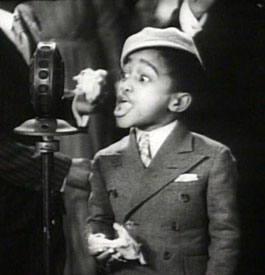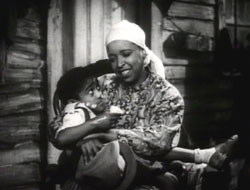 Ethel Waters was hanging laundry when her son Rufus began to cry over being bullied by Sinbad Johnson. She defends her son from the bully, then reassures him he'll be a great man someday, he could even be president. Ethel Waters was hanging laundry when her son Rufus began to cry over being bullied by Sinbad Johnson. She defends her son from the bully, then reassures him he'll be a great man someday, he could even be president.
She then sings the Cliff Hess composition "Lullaby" to her little boy. The lyrics may be interpretable but certainly seem to carry the dubious message to not make waves when treated unjustly.
Even while asserting "all god's children got wings," the main message would seem to be in support of segregation: "Just stay on your own side of the fence & no harm will come to you."
As momma sings the lullaby, Rufus falls asleep in her lap, & then she falls asleep with him, & a dream begins with her little boy running for president, & a big exciting rally in process.
We'll see campaign signs like "Throw Out the Reds, Put In the Blacks" & "We want RUFE & that's the TRUFE" & "Don't be a COOFUS, vote for RUFUS." Rufus wins the vote & soon we see him seated before Congress, his mother seated nearby like Bathesheba at the right hand of Solomon.
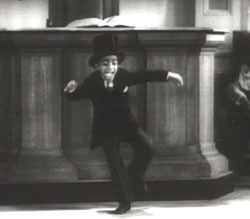 Some people find Rufus Jones for President (1933) one of the more racist films of its era, packing into its twenty minute lyrical references to every stereotype from watermelons & chicken-thieving, to games of craps & razor-toting, with all the while adults behaving like children & electing an actual child for president. Some people find Rufus Jones for President (1933) one of the more racist films of its era, packing into its twenty minute lyrical references to every stereotype from watermelons & chicken-thieving, to games of craps & razor-toting, with all the while adults behaving like children & electing an actual child for president.
The unique position of African Americans assaulted daily by racism may justify suspicions that every minute of Rufus Jones for President has insult imbedded in it.
It's hard for the persistantly assaulted to particularly care that in the same era one finds every ethnic type played stereotypically, from the bucktooth pompous Brits to the short-tempered drunken Irish to bowing & scraping orientals to imbecilic Italians whose organ-grinder monkeys are smarter than their owners.
In the context of its day, the treatment especially of the two central characters of mother & child are great & momentous, & the film is actually about a devoted mother's dreams for her son. And I believe any black kid who saw this film in the theaters in the 1930s would not have been insulted by an allusion to watermelons, but thrilled by the assertion that any one of them might grow up to be president of these United States.
A lot of the stereotypes occur not among the characters as played but in the lyrics to songs, including the classic jazz number "Underneath the Harlem Moon," sung by Ethel Waters: "We also drink gin, puff our reefers when we're feelin' low/ Then we're ready to step out & take charge of any so & so/ Underneath a Harlem moon..."
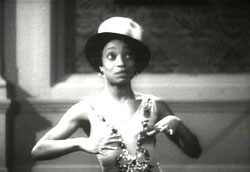 That race stereotypes are alluded to throughout the film isn't the same as these characters being race stereotypes, & as for those lyrics to "Harlem Moon," it seems to me Ethel has in no manner been coerced into demeaning herself or an entire people when singing: That race stereotypes are alluded to throughout the film isn't the same as these characters being race stereotypes, & as for those lyrics to "Harlem Moon," it seems to me Ethel has in no manner been coerced into demeaning herself or an entire people when singing:
"Creole ladies walk along with rhythm in their thighs/ Rhythm in their feet & on their lips & in their eyes/ Where do highbrows find that kind of love that satisfies?/ Underneath a Harlem moon!"
This was the first hit composition from lyricist Mac Gordon, a Russian Jew whose name was originally Morris Gitler. He wrote the lyrics in all sensitivity rife with irony, not insult. It was embraced by black entertainers who sang this song of wealth & Decadence in Harlem -- to audiences who attended church regularly & had very little in their coffers & knew irony when they heard it, & also knew Harlem was indeed a mecca of culture.
It was not an easily misunderstood lyric as it is today, when references to reefer, fights, & passion strike at least an inartistic mainstream as purely racist, the same sorts who today deplore black artists writing & performing their own rap songs for not being about Jesus & clean family living. Really much of this lyric is liberating, whether from today's rappers or yesteryear's Ethel Waters:
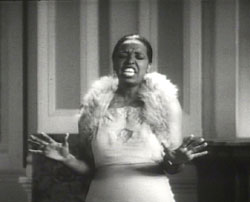 "There's no fields of cotton, pickin' cotton is taboo/ They don't live in cabins like old folks used to do/İTheir cabin is a penthouse up on Lenox Avenue/ Underneath the Harlem moon/ "There's no fields of cotton, pickin' cotton is taboo/ They don't live in cabins like old folks used to do/İTheir cabin is a penthouse up on Lenox Avenue/ Underneath the Harlem moon/
"They just live on dancing/ They're never blue or forlorn/ 'Tain't no sin to laugh and grin/ That's why darkies were born."
Anyone who thinks it's supposed to be taken as a given fact that po' folk only need to dance to feel nourished & never have the blues just ain't usin' their noodle. This song is a self-acknolwedging dream, & when it asserts that people in Harlem never get the blues, it's full-on irony.
Heard outside the bounds of an urban & urbane audience, & outside it's first couple decades of popularity, the lyrics have become increasingly discomfitting to white audiences infused with guilt, & maybe a few members of a black audience out of touch with the very real artistic greatness of the Harlem Renaissance.
No one completely aware would be so eager to hallucinate even Ethel Waters either a victim forced to sing a racist diddy against her will, or a Mrs. Tom diminishing her own people, though to think so requires more anger than comprehension.
As point of fact Ethel radicalizes the song, & I can't believe anyone but she & other members of the cast could've had anything to do with it. The original lyric "You may call it madness, they call it hi-de-ho" is transformed into "White folks call it madness, we call it hi-de-ho," & she adds new lyrics not in the original song at all, & I wouldn't put it past cast members Hamtree Harrison, Dusty Fletcher, & Ethel herself to have colluded on it:
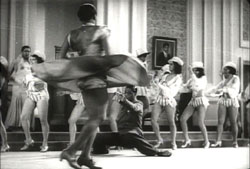 "Once we wore bandanas, now we wear Parisian hats/ Once we were barefoot now we wear shoes & spats/İOnce we were Republican but now we're Democrats/İUnderneath our Harlem moon/ "Once we wore bandanas, now we wear Parisian hats/ Once we were barefoot now we wear shoes & spats/İOnce we were Republican but now we're Democrats/İUnderneath our Harlem moon/
"We don't pick no cotton, pickin' cotton is taboo/ All we pick is numbers, & that includes you white folks too/ Cuz if we hit, we pay our rent on any avenue/ Underneath our Harlem moon."
Even Ethel's possessive use of "Our Harlem Moon" instead of the original "The Harlem Moon" embraces with justified pride everything about Harlem & its great concentration of artistry.
Cliff Hess wrote Rufus's victory song "The Great Day's Come" with the main lead sung by comic Dusty Fletcher assisted by the popular Russell Wooding Jubilee Singers.
Hambone Harrington has the lead on another Hess composition, "Take An Oath," partly a rap song with Rufus declaring "I do! I do!" as a rhymed swearing-in oath is read to him, with more stereotyping referencing to annoy whoever wants to focus on just that one aspect of a richly textured little musical comedy:
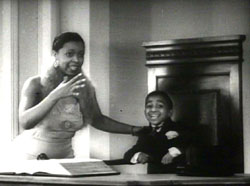 "Now make a law that without no loops/ That there'll be no more locks on chicken coops" & "Swear that watermelon vines/ Are public property all the time," building to Rufus tapdancing up a storm in his tophat. "Now make a law that without no loops/ That there'll be no more locks on chicken coops" & "Swear that watermelon vines/ Are public property all the time," building to Rufus tapdancing up a storm in his tophat.
To the over-sensitive even a chorus line of girls becomes an insult. For "Puttin' it On," the Will Vodery Girls dance on stage. It's big dance number, with a great lindy hopping dance couple amidst a chorus line of tapdancing beauties. The audience is the all-black senate, which gets excited as if at a burlesque house, which pokes fun at Congress not African Americans.
Rufus is played by Sammy Davis, Jr., in his first film, followed swiftly by Seasoned Greetings (1933). His precocious talent as singer & dancer are awe-inspiring, & he is so damned cute that only a cretin would not hope this young man had as much chance at the presidency as Obama.
Sammy's singing talents are spotlighted with his performance at his inauguration of the Sam Theard composition "I'll Be Glad When You're Dead You Rascal You."
copyright © by Paghat the Ratgirl
|
